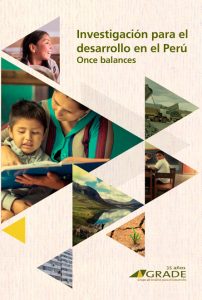Atención y educación de la primera infancia en el Perú: avances y retos pendientes
Investigación para el desarrollo en el Perú: once balances
| Year | : | 2016 |
|---|---|---|
| Author/s | : | Gabriela Guerrero, Flavia Demarini |
| Area/s | : | Education and learning, Methodologies for research and evaluation of policy and programmes |
Guerrero, Gabriela y Flavia Demarini (2016). Atención y educación de la primera infancia en el Perú: avances y retos pendientes. En GRADE. Investigación para el desarrollo en el Perú: once balances. Lima: GRADE.
The first years of a child’s life are fundamentally important. However, not all children are exposed to early experiences that enable them to reach their full potential. By the time children enter primary school, there are obvious gaps in the level of development between children of different socioeconomic statuses. Early Childhood Care and Education (ECCE) programs aim to promote children’s optimal development, providing them with comprehensive care including nutrition, hygiene, and cognitive and socioemotional development, which is why these programs usually intend to prevent and compensate for educational and social inequalities.
ECCE has made considerable progress in Peru in recent decades. This chapter reviews the main ECCE models in light of available national and international evidence regarding their effectiveness. The recognition of early childhood as a national priority in several policy documents, as well as the increase in the availability of preschool education for children aged 4 and 5 years, are among the most positive developments. To further improve ECCE in Peru, this chapter identifies three main remaining challenges: scaling up of good quality ECCE programs for children aged 0 to 2 years, improving the quality of preschool programs for children aged 3 to 5 years, and implementing a national system of monitoring and evaluation of early childhood development.






